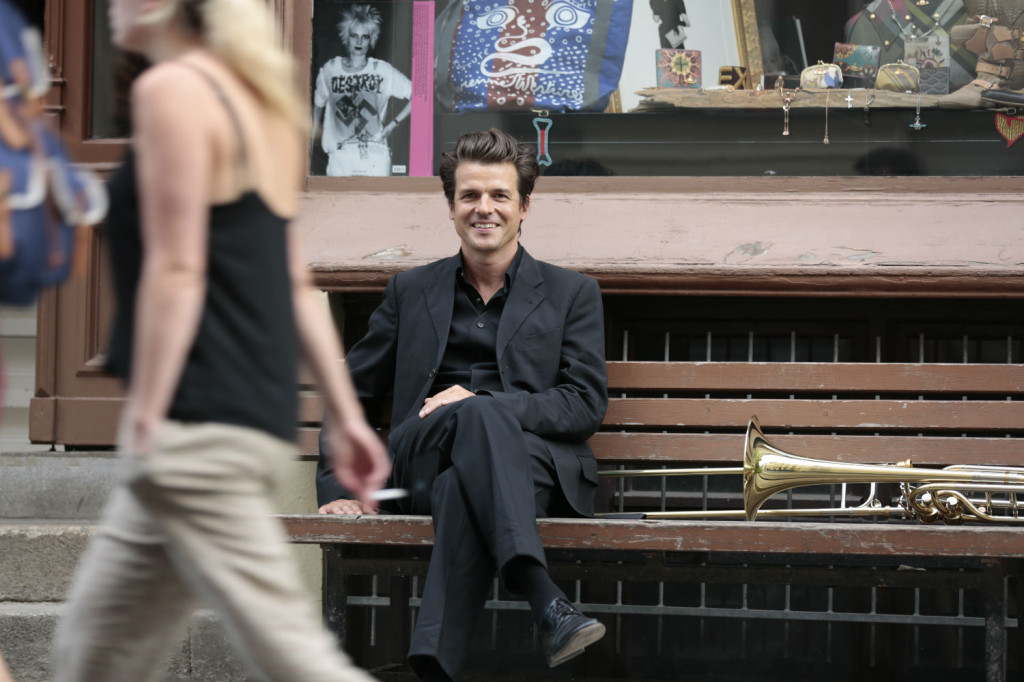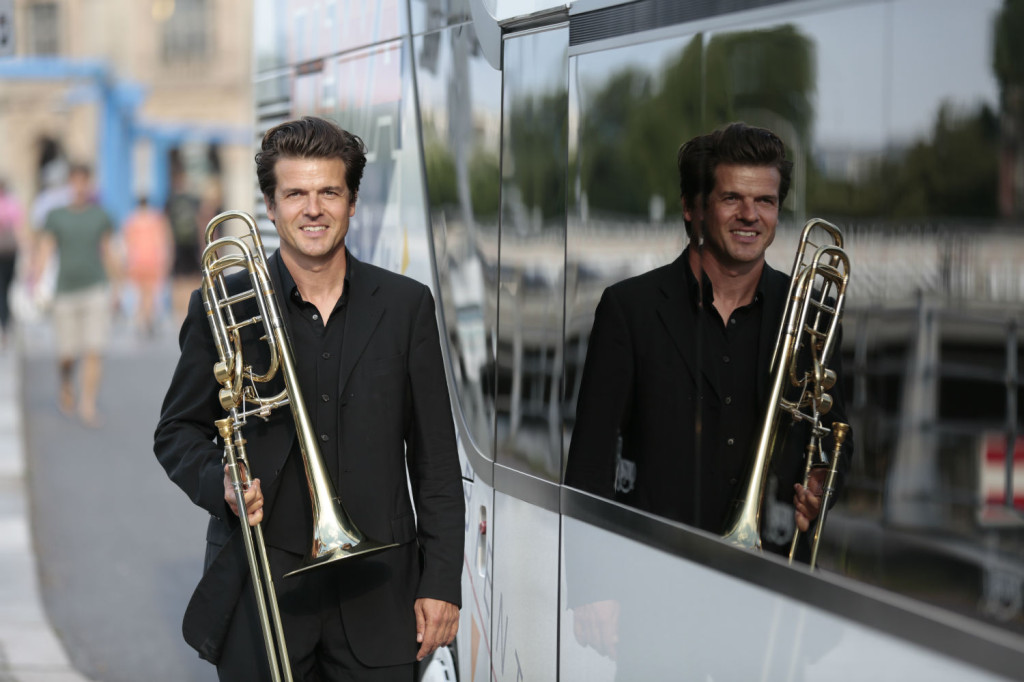Stefan Schulz plays bass trombone in one of the finest orchestras in the world, and shows no signs of being satisfied just yet. An active recitalist and chamber musician, he has emerged as one of the finest classical soloists of his generation and a gifted recording artist. davidbrubeck.com is elated to host Stefan Schulz as the 6th installment of the third collection of “Seven Positions” tm, and to publish the interview in both German and English. Enjoy!
1st Position
What do you look for in an instrument?
In the past I played many instruments and I always hoped I would find one that played by itself. Unfortunately, again and again, I realized I have to practice and play myself.
A good instrument makes me feel like I can talk to it and like it is the extension of my breath. It should speak easily and allow great flexibility while being easy to address or to “talk to”. A great instrument should make it easy to produce different tone colours and timbres.
I have been working with the COURTOIS Company for a while now on the development of a bass trombone that would meet my requirements. I am very much satisfied with the prototype that I am currently playing. This instrument should be on the market soon.
2nd Position
How do you conceive of an ideal tone quality?
I think there is no single, ideal tone. Even what might be considered a “bad” tone might be right, if it is appropriate for and blends in to the music.
3rd Position
What is your secret to a beautiful legato?
If I knew that, I would not hesitate to let you know. I think my own legato is not “a dream of a legato” yet.
4th Position
What helps you achieve musical expression?
I sing a lot, in my mind, but also aloud. In genera,l I record when I practice and then take the time to listen critically to my playing. This helps me a great deal.
5th Position
Name two inspirations.
One musical.
One non-musical.
This question does not translate well.
6th Position SS
Please discuss the care and attention that you and your accompanist give to each note in a phrase. How long do you spend experimenting and have you sought out coaches-(as have many of the prominent violin and piano soloists)?
I take my time to prepare myself. My concerts are prepared well ahead of time. But I am really working for the rehearsals. I am lucky to work with excellent chamber musicians. This is the real fun. We experiment with the notes until we are happy with it. This is how music makes you happy. When I play “Haendel in Harlem”, I can create sounds, that are very different from those in a classical recital. You will hear that on my new CDs.
7th Position SS
The Germanic people are intensely musical; how does this great tradition inform you, and what is it like to play in one of the greatest symphony orchestras in the world?
To play with the Berliner Philharmoniker is, of course, a dream. This orchestra has a huge potential and it inspires me a lot. I am grateful that I have had the good fortune to play with them.
“Tradition” is a different story. I think Leinsdorf said, “tradition is a bag full of bad habits”. There are so many excellent musicians as well as orchestras in the world! I do not think, there is something special about the music in the German-speaking regions.
T1
What is the best trombone playing you have ever heard?
I have heard so many good trombone players. There is not enough room to list them all.
T2
What was the best trombone playing you have done?
I am still waiting for it.
T3
What are some of the adjustments that you make to your playing when switching from symphonic playing to soloing? From soloing to symphonic playing?
The music gives the answer. I do not make any technical changes during my playing. For me, the answer is to look into the “epicenter of the music”.

Erste Lage
Was erwarten Sie von einem Instrument?
ICH HABE IN DER VERGANGENHEIT EINIGE INSTRUMENTE GESPIELT UND IMMER GEHOFFT , DASS ICH ETWAS FINDE WAS VON ALLEIN SPIELT. LEIDER HABE ICH ABER IMMER WIEDER GEMERKT , DASS MAN ÃœBEN MUSS UND DAS ES DOCH AN EINEM SELBST LIEGT.
EIN GUTES INSTRUMENT GIBT MIR DAS GEFÃœHL , DASS ICH DAMIT SPRECHEN KANN – ES ALSO NUR DIE VERLÄNGERUNG MEINES ATEMS IST. ES SOLLTE ALSO EINE LEICHTE ANSPRACHE HABEN UND FLEXIBEL IN DEN MÖGLICHEN KLANGFARBEN.
SEIT EINIGER ZEIT ENTWICKLE ICH MIT DER FIRMA COURTOIS EINE BASSPOSAUNE DIE MEINEN ANFORDERUNGEN ENTSPRICHT. ICH PERSÖNLICH BIN MIT DEM PROTOTYPEN, DEN ICH ZUR ZEIT SPIELE, SEHR ZUFRIEDEN UND DAS INSTRUMENT SOLL DEMNÄCHST AUF DEM MARKT ERHÄLTLICH SEIN.
Zweite Lage
Was verstehen Sie unter einer idealen Tonqualitaet?
GENAU DEN KLANG ZU FINDEN DEN DIE NOTE UND DIE PHRASE BRAUCHT.
ES GIBT MEINES ERACHTENS NICHT EINE IDEALE TONQUALITÄT.
AUCH EIN – VERMEINTLICH HÄßLICHER TON – KANN IDEAL SEIN. ES MUSS ZU DER MUSIK PASSEN.
Dritte Lage
Was ist Ihr Geheimnis fuer ein traumhaftes Legato?
ACH, WENN ICH DAS WÜßTE WÜRDE ICH ES GERN VERRATEN. ICH HALTE MEIN LEGATO NICHT FÜR TRAUMHAFT.
Vierte Lage
Was hilft Ihnen, die musikalische Ausdrucksweise zu erreichen?
ICH SINGE VIEL. IN GEDANKEN ODER ABER AUCH LAUT. ICH NEHME MEIN ÜBEN GENERELL AUF UND NEHME MIR DIE ZEIT MEIN SPIEL KRITISCH ANZUHÖREN. DAS HILFT MIR.
Fuenfte Lage
Bitte nennen Sie zwei Eingebungen/Erleuchtungen (musical/non-musical)
die Sie erlebt haben.
Sechste Lage SS
Bitte erlaeutern Sie die Sorgfalt und Aufmerksamkeit, die Sie und
Ihr Begleiter jeder Note widmen.Wie lange experimentieren Sie?
Oder haben Sie spezielle Lehrer eingesetzt, wie es viele Violin- und Klaviersolisten machen? ICH BEREITE MICH GERN MIT VIEL RUHE VOR. MEINE KONZERTE PLANE ICH LANGFRISTIG. DABEI IST DAS KONZERT NICHT DAS ZIEL AUF DAS ICH HINARBEITE SONDERN VIELMEHR DIE PROBENPHASE. ICH HABE DAS GLÃœCK MIT GROßARTIGEN KAMMERMUSIKPARTNERN ZUSAMMEN ARBEITEN ZU DÃœRFEN . HIER LIEGT DER EIGENTLICHE SPASS – MIT DIESEN MUSIKERN ZU EXPERIMENTIEREN…BIS MAN MIT DER NOTE GLÃœCKLICH IST DIE MAN SPIELT. HIER IST DIE ABWECHSLUNG IN DER MUSIK AUCH SO BEGLÃœCKEND. WENN ICH DAS PROGRAMM “HAENDEL IN HARLEM ” SPIELE, KANN ICH GANZ ANDERE KLÄNGE ERZEUGEN ALS ZUM BEISPIEL BEI EINEM KLASSISCHEN RECITAL KONZERT. ICH DENKE UND HOFFE DAS HÖRT MAN AUCH AUF DEN BEIDEN NEUEN CDs VON BZW MIT MIR. DAS SIND IN MEINEN AUGEN ZWEI GANZ UNTERSCHIEDLICHE PLATTEN.
 Siebte Lage SS
Siebte Lage SS
Man sagt, deutschsprechende Menschen seien besonders musikalisch; in welcher Weise hat diese Tradition Sie geformt, und wie fuehlt man sich in einem der besten Symphonie-
orchester der Welt zu spielen?
BEI DEN BERLINERN ZU SPIELEN IST NATÃœRLICH EIN TRAUM. DIESES ORCHESTER HAT SO EIN UNGLAUBLICHES POTENTIAL. DIE KONZERTE MIT DIESEM ORCHESTER INSPIRIEREN MICH UNGEMEIN.
ICH BIN SEHR DANKBAR , DASS ICH DAS GLÃœCK HABE DORT MITSPIELEN ZU DÃœRFEN.
MIT DER TRADITION IST DAS SO EINE SACHE. ICH GLAUBE ES WAR LEINSDORF DER SAGTE: TRADITION IST EIN SACK VOLLER SCHLECHTER ANGEWOHNHEITEN.
ES GIBT WELTWEIT SO VIELE TOLLE MUSIKER , FANTASTISCHE ORCHESTER – ICH DENKE NICHT , DASS MAN HIER IM DEUTSCHSPRACHIGEM RAUM EINE BESONDERE MUSIKALITÄT FINDET. WENN MAN IN DIESES THEMA TIEFER EINSTEIGEN MÖCHTE DANN VIELLEICHT EHER ÃœBER DIE SPRACHE BZW DAS WORT. ICH GLAUBE HIER GIBT ES IN DER TAT EINE BESONDERE TIEFE DIE MAN VIELLEICHT IN EINER ANDEREN SPRACHE – ZUMINDEST NICHT IN DIESER FORM FINDET . NEHMEN WIR ALLEIN DAS WORT: TROTZDEM / TROTZ DEM. WAS STECKT HIER ALLES DRIN.
T1
Welches war das beste Posaunenspiel, das Sie je gehoert haben?
OH JE , DA GAB ES VIELE. GERECHTERWEISE MUESSTE ICH ALLE NENNEN . SO VIEL PLATZ GIBT ES HIER ABER NICHT.
T2
Was war Ihr eigenes bestes Posaunenspiel?
DARAUF WARTE ICH NOCH UND HOFFE….
T3
Wie veraendern Sie Ihre Spielweise, wenn Sie vom Gruppen- zum Solospiel wechseln und vice versa?
DIESE FRAGE LÖST SICH MUSIKALISCH . ICH ÄNDERE NICHTS TECHNISCHES AN MEINEM SPIEL. DIE ANTWORT ZU DER FRAGE FINDEN WIR IM EPIZENTRUM DER MUSIK.
c. 2014 David William Brubeck All Rights Reserved. davidbrubeck.com
Photos courtesy of Stefan Schulz
Interested in more “Seven Positions†tm Interviews?
Charlie Vernon
James Markey
Chris Brubeck
Doug Yeo
Jeremy Morrow
Tom Everett
Gerry Pagano
Ben van Dijk
Randall Hawes
Denson Paul Pollard
Thomas Matta
Fred Sturm
Bill Reichenbach
Massimo Pirone
Erik Van Lier
Jennifer Wharton
Matyas Veer
Stefan Schulz
c. 2013/2014 David William Brubeck All Rights Reserved davidbrubeck.com

